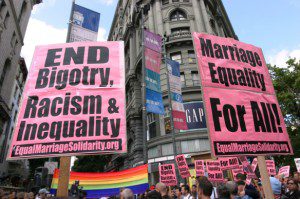LGBTQ marriage equality fight moves ahead
 For almost 400 years, since the first English settlers began stealing land from the original inhabitants of North America, legal practice has been to deny couples of the same sex the right to marry.
For almost 400 years, since the first English settlers began stealing land from the original inhabitants of North America, legal practice has been to deny couples of the same sex the right to marry.
The walls of denial finally began to crumble in 2004, when Massachusetts became the first state to grant same-sex couples this basic human right.
The year 2015 may be the year that marriage equality finally becomes enshrined in law throughout the 50 states. On Jan. 16, the Supreme Court of the United States announced that it would hear the cases of couples in four states who sued to overturn their states’ marriage bans.
The decision was made after a three-judge panel of the Sixth District Court of Appeals in Cincinnati voted two-to-one to uphold marriage bans in Michigan, Ohio, Kentucky and Tennessee. Up to that point, courts had been ruling in favor of marriage equality, casting down bans in all but 14 states.
The high court was, reportedly, declining to hear any cases and intended to let the lower court rulings stand unless there was a split in court opinion. With the Cincinnati court ruling — based on a phony “voting rights” argument that an electorate should be allowed to deny civil rights to the lesbian, gay, bisexual, transgender and queer communities — the decision was made to hear the issue.
If the court rules in favor of the plaintiffs, same-sex marriage bans will be nullified in all of the remaining 14 states. A contrary ruling in favor of reactionary “states rights” arguments — historically the refuge of segregationists — could restore marriage bans in some states.
A large number of holdout states are in the former Confederacy, including Georgia, whose “anti-sodomy” law was the subject of the 1986 Hardwick decision. Then, the Supreme Court upheld the bigoted law criminalizing gay sexual expression.
Michigan becomes a battleground
The 2003 Lawrence decision overturned Hardwick. Michigan was one of five states with the hateful laws still on the books; its law had been one of the worst as well, with life imprisonment for a second offense. LGBTQ people have no anti-discrimination protection in state law here and the state legislature has passed a number of bigoted bills, signed by Gov. Rick Snyder.
Thus, it took tremendous courage for two Detroit-area nurses, April DeBoer and Jayne Rowse, to sue the state for the right to jointly adopt the three children they have been raising. Michigan law forced one or the other of them to adopt the children as a single parent. Federal Judge Bernard Friedman determined last year that the adoption rights issue was linked to the right to marry and overturned the Michigan marriage ban that had been passed by voters in 2004.
Similar bans were struck down in Ohio, Kentucky and Tennessee, until the higher court in Cincinnati upheld them.
DeBoer and Rowse are ecstatic to have their case move forward and be heard by the high court. “Stand up for what you believe, ‘cause that’s what we are doing,” DeBoer said. (Detroit News, Jan. 17)
While a close Supreme Court vote in favor of marriage equality is seen as a likely outcome, it should not be treated as a foregone conclusion. In 2012, the court only struck down portions of the “Defense of Marriage Act” pertaining to the federal government, leaving state bans in place. It is a sign of strength and decades of perseverance by the LGBTQ movement that these bans are now falling apart.
A second victory took place in Michigan when federal judge Mark Goldsmith, a day before the Supreme Court announcement, ordered the state of Michigan to recognize the 323 same-sex marriages performed in the state during a brief window of opportunity between Judge Friedman’s ruling and its stay by the District Court. Gov. Snyder had denied state marriage benefits to these couples, who have been receiving federal benefits. It is not yet known if Tea Party-associated Attorney General Bill Schuette will challenge Goldsmith’s ruling, which the judge stayed for 21 days to allow for appeal.
The ruling in favor of the 323 is another setback for the forces of bigotry, which have been pushed back repeatedly in the 45 years since the Stonewall Uprising of 1969.

